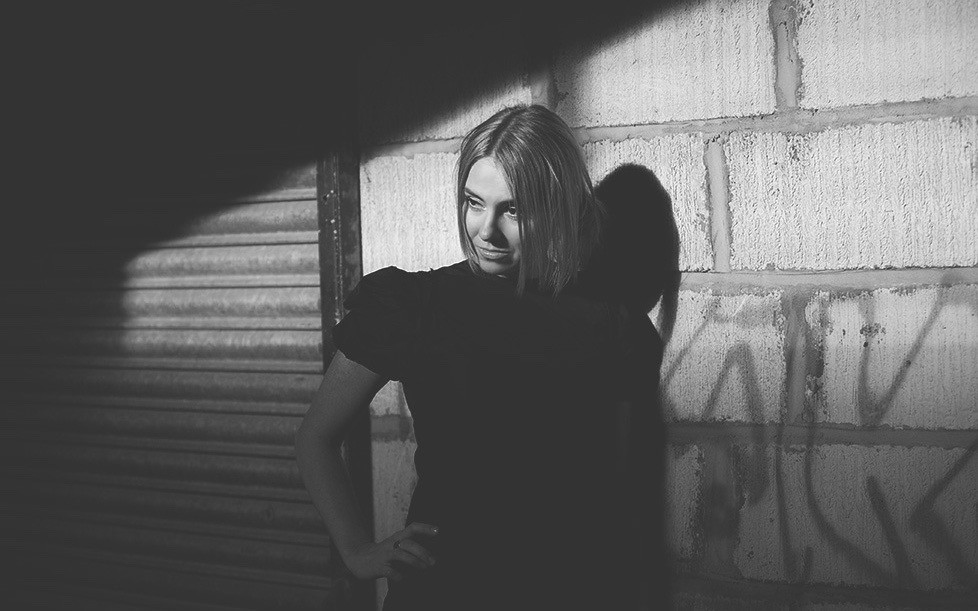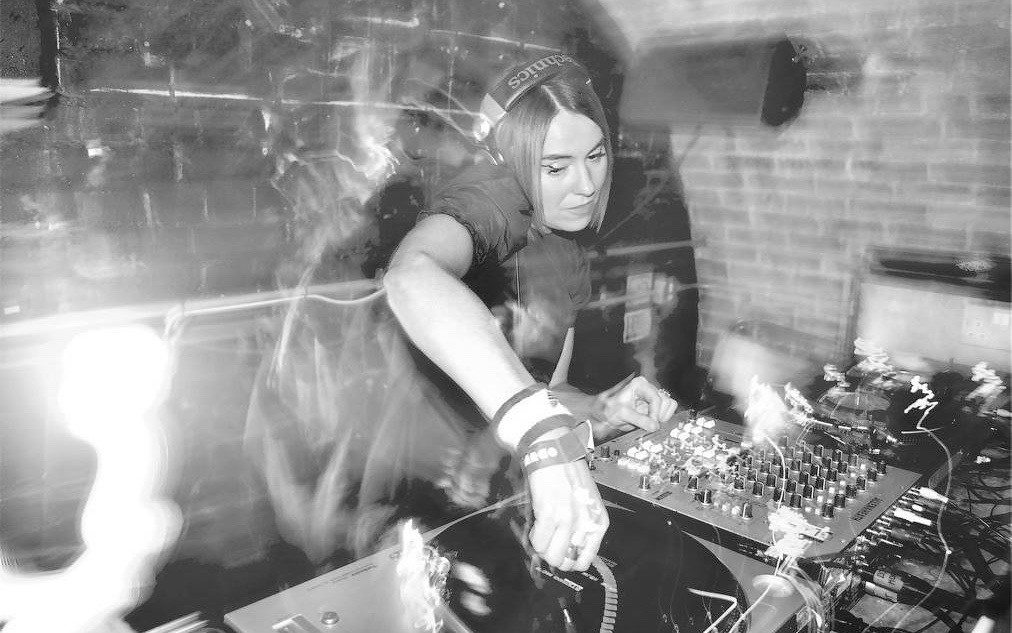Power Stations In The Desert // Andrea Parker

I remember hearing Andrea Parker's work for the first time, picking up a copy of the 'Melodius Thunk' 12" on impulse. It sounded like some dark-as-fuck alternative Goldeneye soundtrack, sweat drenched rhythms and feverish melodies shuddering between Parker's impenetrable blasts of crater-dwelling low-end. Delving deeper, I discovered her discography is rife with twisted electro gems - a genre with which I was had never expressed much interested in before. Listening to the earth-rumbing swagger of 'The Swamp' cemented her as an artist with whom I'd be dedicating a rather large amount of listening time to.
Alongside her solo productions, Parker has worked extensively with Dave Morley and also finds the time to run two labels - Touchin' Bass and Aperture. While the former focuses on boundary-nudging dancefloor music, Aperture enjoys a far wider repertoire, releasing the wonderfully fractured collection of noise experiments, No.3. Obliate, by T.e.s.o recently for example.
With an EP by Berlin based Dead Fader out on Touchin' Bass a number of months ago and an upcoming performance from Parker due at this year's Bloc festival, we decided to catch up with the Kent born artist to discuss her two labels, meeting the Director of the Daphne Oram Collection and watching Mark Bell cycle into a lake...
Hi Andrea, first off how are things? You're playing at this year's Bloc festival - have you been to previous editions? Anyone in particular you are looking forward to seeing play?
Alright, thanks. I’m a bit battered after drinking my own body weight in booze over Christmas and New Year, but apart from that all good.
Funnily enough, I’m coming back to play at Bloc after headlining one of their first ever do’s in Brighton about twelve years ago. I’ve been to the odd few in between but more often than not I end up missing the main artist I’ve gone to see, usually due to the fact that I’ve been cleaning my chalet again! That said, I’ve seen some great artists there in the past. This year I’m looking forward to seeing Ugandan Methods featuring Regis & Ancient Methods, Trade featuring Surgeon & Blawan, Powell, Objekt, Evian Christ, Daniel Miller, Jeff Mills and a bit of Fast Eddie of course.
Touchin' Bass has been running since 2002, seeing nearly 50 releases. How do you think the label's ethos has changed over the years and how do you think it has staying the same?
The first release was in 2001 but yes, one more release to go before hitting 50. The ethos is pretty much the same really. It’s always been about a different take or outlook on electro. Electro meaning taking electronic music to its furthest extremes. I’ve always had a very resolute attitude and an uncompromising vision. The main ethos is to keep pushing forward-thinking, non-generic music.
You released an EP by Dead Fader most recently on the label - can you tell us about how you first came across John's work?
A superb EP it is, too. The Dosage EP. Very industrial and distorted. I first got into his work when I heard his EP ‘Work It, No’ on Fumihiko Records. It was a really heavy slab of industrial vinyl. I’m also really into Sensational, who he collaborated with on one of the tracks. I pretty much tore the arse out of it and played it in nearly all my sets. It still works really well today.
I read you used to play Cello, and worked as a session singer for some time as well. Do you still keep up with the Cello? Tell us about how you've incorporated strings/vocals into your music previously.
It is true that I started out at a session singer, singing over hardcore tracks but the less said about that the better! I’m actually just about to get a pickup installed in my Cello so I can distort the hell out of it! I love the sound of the Cello, it can sound so ominous and dark, yet so beautiful. Strings have always been a big part of my writing. I first worked with a 40 piece orchestra in 1996 when I recorded ‘The Rocking Chair’, now it seems like everyone is at it?! I used strings a lot on my earlier Mo Wax recordings. I don’t actually read music, I just fuck around until I hear what’s in my head. I usually have a very clear vision. It’s the same with vocals. I don’t class myself as a singer, I just try to use my voice as another instrument (with lashings of reverb!) although I do really love writing lyrics, it’s a great outlet.

I’ve been listening to your album with Daz Quayle reinterpretting some of Daphne Oram's most notable releases - it's excellent! Do you remember the first time you heard her work? How did the project come about?
Thank you. I feel it’s our best work to date. It was an honour for me as she has always been an inspiration throughout my career and one of my idols. I first heard her work about 20 years ago, mainly through her work with the BBC Radiophonic Workshop. It used to infuriate me that she never got the credit she deserved but thankfully now her legacy is starting to be recognised, like with the installation of a replica of the Oramics machine at the Science Museum in London.
To build something as pioneering and as unique as the Oramics machine to read waveforms drawn on 35mm film which triggered sounds as it was passed through a beam of light is the concept that paved the way for electronic music as we know it today; the earliest form of the electronic synthesiser! Truly amazing and a great slice of British engineering and mathematics, all built into the empty shell of her own dressing table! The story behind this album began when I was called into a meeting at The Royal Festival Hall who were putting together The Oramics Night - a night celebrating Daphne Oram and the Oramics machine. They were looking for an artist who could write and produce an original piece of music incorporating some of Daphne’s sounds and then perform the piece live. I couldn’t believe the opportunity I had been given. The defining moment for me was when I was given access to Daphne’s numerous recordings and sounds. These sounds, like Daphne's Oramics machine itself, are a part of British musical history. Where America had Bob Moog, Britain had Daphne Oram. Daz and I used literally hundreds of samples and all 100 channels of our mixer for this one piece. We knew we couldn’t stop there! We felt like we had only scratched the surface and wanted to dig deeper into the life and works of Daphne Oram to create an entire album, to unfold the story even more.
We wanted the chance to re-work, re-interpret and manipulate these sounds to create a unique concept album. I arranged to meet with Dr. Mick Grierson, Director of the Daphne Oram Collection at Goldsmiths College and Secretary of the Daphne Oram Trust and, after hearing the idea, he thankfully agreed. We spent hundreds of hours sampling these sounds and treating them through various noise reduction processors, trying to strike the balance between making them audible in the mix without losing the individual characteristics of the original sounds. We wanted to use some of the less-obvious, unnerving sounds we found in the archives to explore a different side of Daphne Oram, a darker side, incorporating them alongside sounds from my own archives (made using analogue synthesisers like my beloved Arp2600!). Available now at aperturerecords.com!

How did you first get into electro and where do you see the genre going in the future? Any particular artists we should check out?
It was mainly to do with my love for, and fascination with the 808 boooooooooom! I also grew up watching breakdancing on lino in the shopping precinct on Saturdays where I got to hear a lot of electro. Electro to me was always a bit out there, futuristic. What I loved is that it kept developing, changing forms and moving forward. You had artists like Kraftwerk, Newcleus, Hashim, Man Parrish, Jonzun Crew in the beginning, then the next generation of artists like Drexciya, Model 500, Dopplereffekt, Electronome, IL.EK.tro and Ben Milstein moved it forward, with labels like SCSI-AV, Outside, Panic Trax and Touchin’ Bass releasing the more futuristic and experimental side of electro, pushing the boundaries. For me, artists like Einoma and Bitstream got it to where it needed to be, but now it’s all about Fastgraph and Ultradyne.
What music were you into when you were growing up in Kent?
All sorts. I certainly went through a lot of phases. The Specials, KRS ONE, Bauhaus, Ryuichi Sakamoto, This Mortal Coil, Joy Division, The Ultra Magnetic MC’s, Siouxsie and the Banshees, The Flying Lizards, Japan, The Human League, The Smiths, Public Enemy, The Fall, Coil, Throbbing Gristle… then it all went mental, with me driving round motorways trying to find illegal raves…. aciiiiiiiiiid!
I was reading in a comment on Discogs that you played at a '10 years of R&S event' in 1994 alongside David Morley in Ghent, attended by the likes of CJ Bolland, Derrick May and Carl Craig just to name a few. Do you remember the occasion? What was it like having so many notable producers in one place?
That is a gig I will never forget. It was a stellar line up and quite intimidating to be amongst so many people that I was already into and really admired. It was called ’10 Days of Techno’ and that’s exactly what it was! I have to mention LFO, because my biggest memory of that gig was Mark Bell cycling into the lake… don’t ask?! Seriously, David and I played live. From what I can remember we had David’s Fairlight with discs the size of a 12” (one of which I dropped down the back of the stage!), an Arp which he had to turn on with a key and always performed differently in different temperatures, an R8 drum machine, a turntable, SFX... I can’t really remember the rest. But the amazing thing about that gig was that we only had a few days to get it all together and that’s how Two Sandwiches Short of a Lunchbox was formed. Renaat Vandepapeliere then released it as an EP immediately afterwards on Apollo, a subsidiary of R&S Records.
How did you first meet David Morley?
It was Renaat who actually hooked me up with David. I was DJing at Lost in about 1993 and I played one of David’s records in my set. Renaat introduced himself to me and I mentioned that I loved David’s work and analogue synths, then to cut a long story short, the next thing I knew I was standing on his doorstep in Belgium! I walked into his studio and I was like a kid in a sweet shop. It was ridiculous. It was like an analogue museum. We had a chat about music, then decided to experiment and go for it…
Finally what's next for yourself? What can we expect to see next on Touchin' Bass/Aperture?
Next year will be an exciting one. I’m 45 and I’m going to Dungeness to see power stations in the desert... It’s the 50th release on Touchin’ Bass, the 10th release on Aperture and I will also be releasing some more collaborations with Daz Quayle. Hopefully I will finish my album… if I can stop having accidents and injuring myself! Other than that I’m hoping to visit my adopted polar bear in Svalbard and get some more honey from my bee hive in Shropshire.
- Published
- Jan 4, 2016
- Credits
- Words by Theo Darton-Moore
